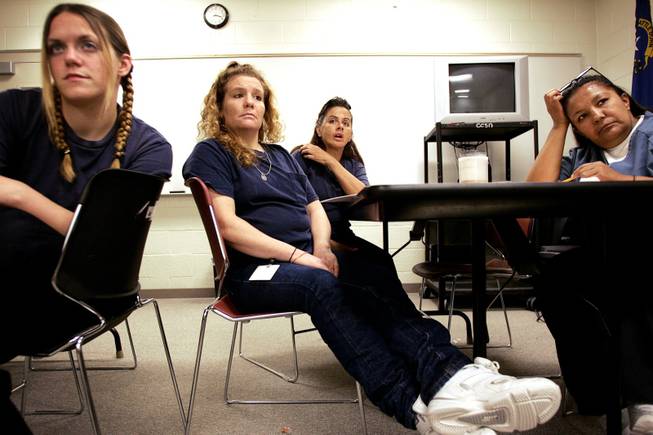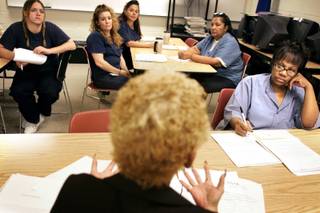
Inmates, from left, Stacy Elliot, Jonni Heltz-Meissner, Michelle Breshears and Deanna Fajardo listen during Survivors Overcoming Abuse and Rape (SOAR) class at Florence McClure Women’s Correctional Center.
Sunday, Sept. 13, 2009 | 2 a.m.
Sun Archives
- Six questions for Lu Torres (7-16-2009)
- Bill aims to give rape victims legal shield others have (2-27-2009)
- Rape still a crime where victim can share blame (8-17-2008)
- Helping rape victims (5-16-2008)
- A small silver lining (2-28-2006)
- State program seeks bigger awards for victims (2-1-1997)
Beyond the Sun
Quiet your mind, the workbook instructs, by imagining a snowy mountain. See yourself skiing. Set aside time, maybe over morning coffee, to envision the winter scene in your mind. Stop the nagging, negative thoughts. Imagine yourself cold and loose and calm.
It’s a preposterous meditation for Nevada prisoners sitting in a concrete classroom in the dead of summer with blaring televisions and the voices of inmates and guards ringing around them.
When it gets too loud, Marcella Henderson tells fellow inmates, “I go to the shower and I just stand there.”
The inmates nod. In prison, where there’s no privacy, no dreamy morning coffee breaks, your snowy mountain is a shower stall.
“Everybody has to make their own space,” says Shizue Hill, the instructor in charge of this particular class. “Everybody has to have at least one happy thought.”
Hill makes weekly visits to the Florence McClure Women’s Correctional Center, a building on the outskirts of Las Vegas guarded by barbed wire. Since 2005, she has led the SOAR program, short for Survivors Overcoming Abuse and Rape. On this Thursday, her seven students gather in a windowless classroom for a two-hour lesson on “thought stopping.”
They’re in for drugs, attempted robbery, DUI, prostitution, forgery.
They were raped, or sexually abused as children, or both, some multiple times.
They’re moms, all but one.
Nobody suggests, even once, that they don’t deserve to be in prison. Nobody minimizes their arrest records, or blames their crimes on their abuse.
Still, female inmates routinely report high rates of rape or childhood sexual abuse before incarceration — depending on what research you read, from 40 to 80 percent of imprisoned women report histories of sexual assault, percentages that greatly exceed those reported by women who aren’t behind bars. Studies also routinely demonstrate that the percentage of incarcerated women with histories of substance abuse is greater than that of women in the general population.
Some believe these phenomena are related, and evidence of something obvious: Being raped or molested can start a cycle — drugs, drinking, addiction, poverty and more abuse — that ends with incarceration.
Most of the women in Thursday’s SOAR class struggled with substance abuse, and most thought those struggles had something to do with their history of victimization.
Henderson was raped by a man who infected her with HIV. She spent the years afterward “stuffing things that hurt with drugs” and running into the law because of it.
Another inmate, Michelle Breshears, was sexually abused as a child by an adult acquaintance — a confusing exchange that set into motion a pattern of problematic relationships, drug abuse and “very, very low self esteem.”
Breshears remembers sitting in court one day, waiting to be sentenced for another petty crime, watching a man facing molestation charges and wanting to scream, “Look at me! I’m what you did! I’m the impact you have by your crime on a child! Look at my life today because of it!”
Anyone who has been sexually assaulted needs help dealing with the myriad issues that can spring up as a result, said Lu Torres, director of the Rape Crisis Center, which runs the SOAR program. Inmates are no different. For women behind bars, in fact, the stakes may be higher — without coping skills to deal with prior traumas, Torres says, living in society, staying out of trouble, only gets harder.
“A lot of women who have been sexually assaulted act out,” she said. “It becomes a vicious cycle. They go in, they get out, they haven’t dealt with the sexual violence, so the pattern continues.”
Hill, a victims advocate at the Rape Crisis Center, runs similar programs at the Clark County Detention Center and Las Vegas city jail. It’s the women at Florence McClure, however, who make up her core class — students serving enough hard time to complete the 12-week program.
The curriculum, photocopied from a workbook clearly written for people who aren’t incarcerated, doesn’t always suit the students. Hill adapts.
When negative thoughts overwhelm, one handout suggests, halt everything and shout “STOP!”
“You can’t really do that,” Hill says. It would look a little nuts. So she asks the inmates to volunteer happy thoughts.
Seeing my kids, someone says, talking to Mom, getting a good dessert with dinner, “a beach scene with sunsets and waves.”
When it’s Henderson’s turn, she says, “I have to live for my children.”
There are tears. Women talk and their voices hit that ready-to-cry quaver.
Deanna Fajardo worries about her anger, about painful memories.
“I’m trying to get rid of it, just let it all go, not hold on to any part of it,” she says, “And boom! Here it comes back again.”
“It never really all goes away,” Henderson says.
In some way, Breshears says, maybe breaking the law, getting caught and generally living on the wrong side of the tracks was a kind of self-mutilation, a way of dealing with unresolved guilt and blame, “kind of like your own form of punishment.”
These are not easy conversations to have, behind bars or not.
Outside the classroom, inmates put on a prison facade; they can’t appear weak.
Inside the classroom, Hill makes them mine old feelings of guilt, blame and rage — digging up the same messy stuff they work so hard to ignore.
“Open up because it makes you vulnerable,” inmate Melissa Eller says. “But talking about it gives you power over it.”
In an earlier class, the inmates wrote letters to the person who hurt them. After that, they worked on seeing themselves as survivors of sexual assault. Then they explored their recurring negative thoughts. Now they’re learning to work through them. In a few weeks they’ll graduate from the program. Maybe some day after that, Hill says, they’ll come see her on the outside to ask for more help.
Stacy Elliot — molested by a foster parent, then a family member — says she’s exactly where she should be, for now.
“I think my life is going to change when I get out of here,” she says. “We’ve got another light in our eyes, another thought in our minds. We’re survivors, and we can hold that in our hearts.”


Join the Discussion:
Check this out for a full explanation of our conversion to the LiveFyre commenting system and instructions on how to sign up for an account.
Full comments policy